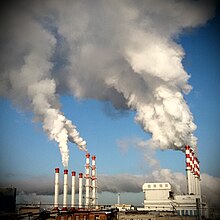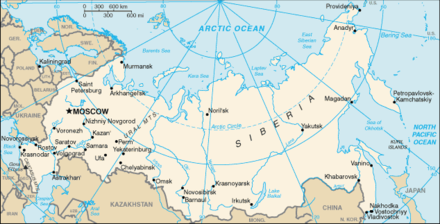
Back الطاقة في روسيا Arabic Energiewirtschaft Russlands German Energia Venäjällä Finnish Énergie en Russie French Энергетика России Russian Rusya'da enerji Turkish


The Energy in Russia is an area of the national economy, science, and technology of the Russian Federation, encompassing energy resources, production, transmission, transformation, accumulation, distribution, and consumption of various types of energy.[1]
Energy consumption across Russia in 2020 was 7,863 TWh.[2] Russia is a leading global exporter of oil and natural gas[3] and is the fourth highest greenhouse emitter in the world. As of September 2019, Russia adopted the Paris Agreement.[4] In 2020, CO2 emissions per capita were 11.2 tCO2.[5]
Russia has no plans to become carbon neutral before 2100 and intends to exploit fossil fuels in the Arctic for the Asian market.[6]
- ^ Государственный стандарт Союза ССР. ГОСТ 19431-84 "Энергетика и электрификация. Термины и определения". — Москва: Стандартинформ, 2005.
- ^ "BP Statistical Review of World Energy 2021" (PDF). Retrieved 8 September 2021.
- ^ International Energy Agency (21 March 2022). "Energy Fact Sheet: Why does Russian oil and gas matter?". IEA. Retrieved 27 April 2022.
- ^ Sauer, Natalie (24 September 2019). "Russia formally joins Paris climate pact". www.euractiv.com. Retrieved 8 November 2021.
- ^ "Russia Energy Information | Enerdata". www.enerdata.net. Retrieved 8 November 2021.
- ^ "Russia resists tougher climate targets in dash for Arctic gas". 16 November 2020.